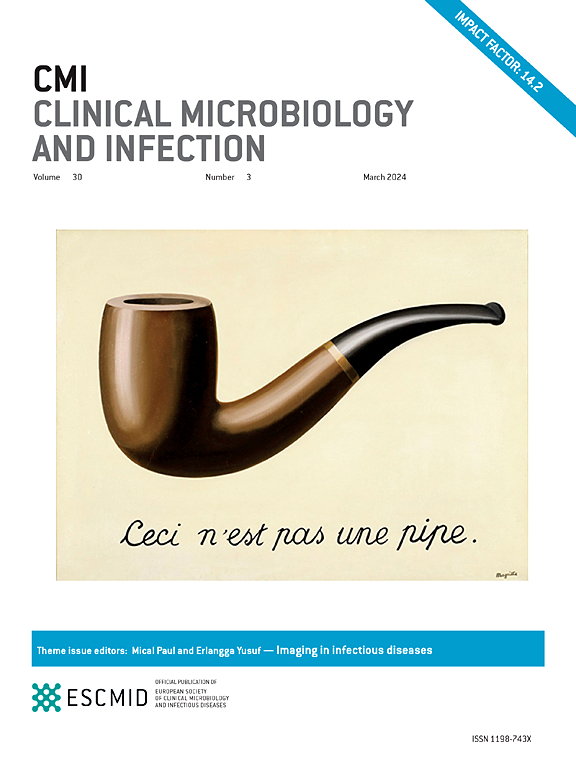Efficacy and safety of ZX-7101A, an inhibitor of influenza cap-dependent endonuclease, in adults with uncomplicated influenza: a randomized, double-blind, placebo-controlled phase 2/3 trial
IF 10.9
1区 医学
Q1 INFECTIOUS DISEASES
引用次数: 0
Abstract
Objectives
To evaluate the efficacy and safety of ZX-7101A: an inhibitor of influenza viral cap-dependent endonuclease, in adults with uncomplicated influenza and explore treatment-emergent resistance.
Methods
We conducted a randomized, double-blind, placebo-controlled, adaptive-design phase 2 and phase 3 studies (ZX-7101A-202) in adults with uncomplicated influenza. Eligible patients were randomized 1:1:1 to receive a single dose of 40 or 80 mg ZX-7101A or placebo, stratified by body weight and baseline composite symptom score. The primary efficacy endpoint was time to alleviation of influenza symptoms (TTAS) in intention-to-treat infected population.
Results
The phase 2 trial suggested significantly shorter TTAS for ZX-7101A compared with placebo: the median TTAS of 40 or 80 mg ZX-7101A groups were 34.7 hours (95% CI, 22.8–43.4; p 0.005) and 45.8 hours (95% CI, 32.0–66.3; p 0.020), compared with 63.6 hours (95% CI, 43.9–93.4) in the placebo group. In the phase 3 trial, the TTAS of both ZX-7101A dose groups was significantly shortened relative to the that of placebo group: the median TTAS was shortened to 48.4 hours (95% CI, 40.5–55.6) for 40 mg group and 39.4 hours (95% CI, 35.8–49.3) for 80 mg group, compared with 62.9 hours (95% CI, 56.4–69.3) for placebo group (p 0.003 and p < 0.001, respectively). In the safety population, ZX-7101A treatment was associated with fewer adverse events, with 41.8% (100/239) in the 40 mg group, 44.2% (106/240) in the 80 mg group, and 53.8% (129/240) in the placebo group. The majority of adverse events were mild or moderate. Emergence of resistance to ZX-7101A through I38T amino acid substitution was detected in 5/278 (1.8%) patients.
Discussion
ZX-7101A was an effective treatment for influenza with a single dose of either 40 mg or 80 mg, with more rapid alleviation of influenza symptoms vs. placebo. No safety concerns were identified with single dose treatment of ZX-7101A.
流感帽依赖性内切酶抑制剂 ZX-7101A 对无并发症流感成人患者的疗效和安全性:随机、双盲、安慰剂对照的 2/3 期试验。
目的评估流感病毒帽依赖性内切酶抑制剂 ZX-7101A 在无并发症流感成人患者中的疗效和安全性,并探索治疗中出现的耐药性:我们在成人无并发症流感患者中开展了一项随机、双盲、安慰剂对照、适应性设计的 2 期和 3 期研究(ZX-7101A-202)。符合条件的患者按照体重和基线综合症状评分,以1:1:1的比例随机接受单剂量40或80毫克ZX-7101A或安慰剂。主要疗效终点是意向治疗感染者(ITTI)的流感症状缓解时间(TTAS):2期试验表明,与安慰剂相比,ZX-7101A的TTAS明显缩短:40或80毫克ZX-7101A的中位TTAS分别为34.7小时(95%置信区间[CI],22.8-43.4;p=0.005)和45.8小时(95%CI,32.0-66.3;p=0.020),而安慰剂组为63.6小时(95%CI,43.9-93.4)。在3期试验中,与安慰剂相比,ZX-7101A两个剂量组的TTAS均显著缩短:40毫克组的中位TTAS缩短至48.4小时(95%CI,40.5-55.6),80毫克组缩短至39.4小时(95%CI,35.8-49.3),而安慰剂组为62.9小时(95%CI,56.4-69.3)(p=0.003和p结论:ZX-7101A单次剂量为40毫克或80毫克,与安慰剂相比,能更快地缓解流感症状,是治疗流感的有效药物。单剂量治疗 ZX-7101A 未发现安全问题。
本文章由计算机程序翻译,如有差异,请以英文原文为准。
求助全文
约1分钟内获得全文
求助全文
来源期刊
CiteScore
25.30
自引率
2.10%
发文量
441
审稿时长
2-4 weeks
期刊介绍:
Clinical Microbiology and Infection (CMI) is a monthly journal published by the European Society of Clinical Microbiology and Infectious Diseases. It focuses on peer-reviewed papers covering basic and applied research in microbiology, infectious diseases, virology, parasitology, immunology, and epidemiology as they relate to therapy and diagnostics.

 求助内容:
求助内容: 应助结果提醒方式:
应助结果提醒方式:


